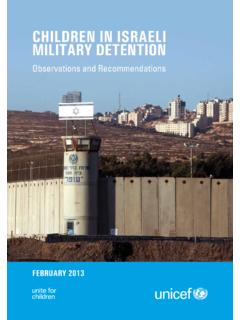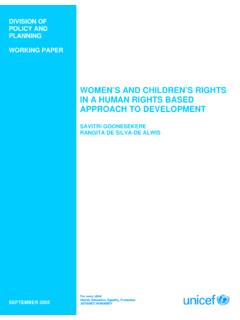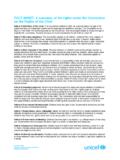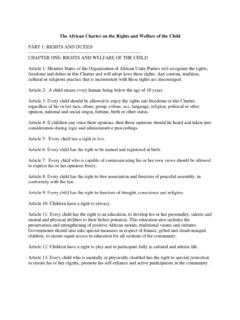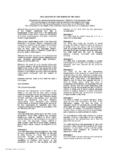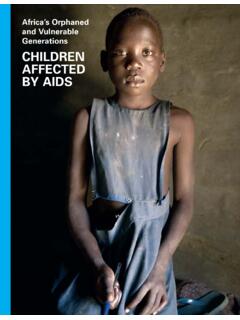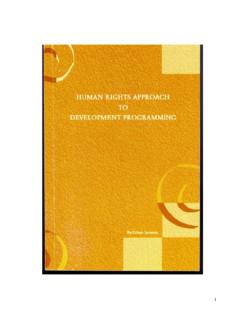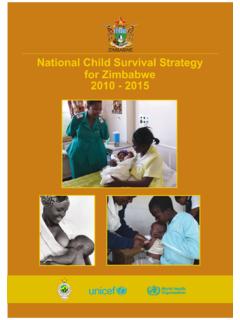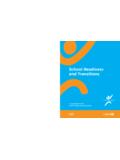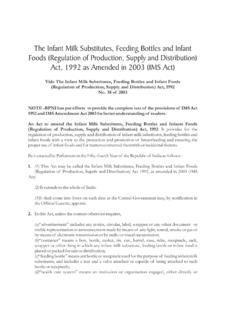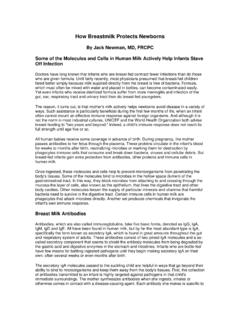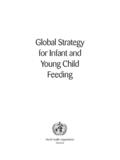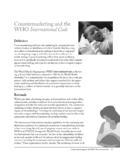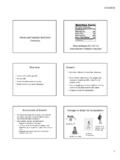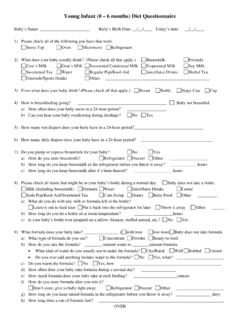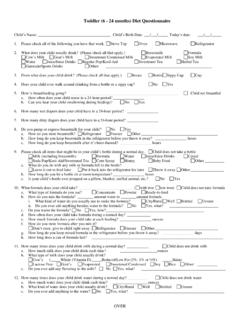Transcription of Key Messages Booklet - UNICEF
1 Key Messages BookletThe Community infant and Young Child Feeding Counselling Package September 2012 Key Messages BookletiKey Messages BookletThe Community infant and Young Child Feeding Counselling PackageSeptember 2012 Key Messages BookletiiKey Messages BookletiiiCounselling Cards: Key Messages 1. Nutrition for pregnant and breastfeeding women ..1 2. Pregnant woman / delivery in facility ..2 3. During the first 6 months, your baby needs ONLY breast milk ..3 4. Importance of exclusive breastfeeding during the first 6 months ..4 5. Breastfeed on demand, both day and night (8 to 12 times) to build up your breast milk supply ..5 6.
2 Breastfeeding Positions ..6 7. Good Attachment ..7 8. Feeding a low birth weight baby ..8 9. How to hand express breast milk and cup feed ..9 10. When you are separated from your baby ..10 11. Feeding the Sick Baby under 6 months of age ..11 12 . Good hygiene (cleanliness) practices prevent disease .. 12 13 . Start complementary feeding when baby reaches 6 13 14. Complementary feeding from 6 up to 9 months ..15 15. Complementary feeding from 9 up to 12 months ..17 16. Complementary feeding from 12 up to 24 months ..19 17. Food Variety ..21 18. How to Add Multiple Micronutrient Powders (MNPs) to Complementary Foods.
3 22 19. Feeding the Sick Child older than 6 months of age ..23 20. Optimal family planning promotes improved health and survival for both mother and child ..24 21. Regular growth monitoring and promotion ..25 22. When to bring your child to the health Messages Bookletiv23a. Exclusively breastfeed and take ARVs ..2723b. Exclusively breasfteed even when there are no Circumstance Cards Card 1: Avoid all Breastfeeding ..29 Card 2: Conditions needed to avoid all breastfeeding ..30 Card 3: Non-breastfed child from 6 up to 24 months ..31 Take-home brochures Nutrition During Pregnancy and Breastfeeding.
4 32 How to Breastfeed Your Baby ..33 How to Feed a Baby After 6 Months ..34 This set of cards was developed for you to help counsel mothers and other caregivers about infant and young child feeding (IYCF). Positive counselling skills are important for your success. Some basic counseling skills presented below include Listening and Learning, as well as Building Confidence and Giving and Learning skills Use helpful non-verbal communication: Keep your head level with the mother (or caregiver) Pay attention Reduce physical barriers Take time Touch appropriately Ask open questions Use responses and gestures that show interest Reflect back what the mother (or caregiver) says Avoid using judging wordsBuilding Confidence and Giving Support skills1.
5 Accept what a mother (or caregiver) thinks and feels. Let the mother (or caregiver) talk through her or his concerns before correcting any wrong ideas or mis-information. This helps to establish Listen carefully to the mother s (or caregiver s) Recognize and praise what a mother (or caregiver) and child are doing Give practical Give a little, relevant information at a time. 6. Use simple language that the mother or caregiver will Use appropriate Counselling Card(s) or Take-Home Brochure(s).8. Make one or two suggestions, not commandsIYCF 3-Counselling:The following 3-Step Counseling will help you to counsel, with mothers (or caregiver) about infant and young child feeding.
6 The 3-Steps are Assess, Analyze and 1: Assess: ask, listen and observe Greet the mother (or caregiver), using friendly language and gestures. Ask some initial questions that encourage her (or him) to talk. Listen to what is being said and observe what is going on using your Listening and Learning, and Building Confidence and Giving Support skills. Assess the age appropriate feeding practice(s) and the condition or health of the child and mother (or caregiver). Step 2: Analyze: identify difficulty and if there is more than one prioritize the difficulties Decide if the feeding you observe is age-appropriate and if the condition or health of the child and mother (or caregiver) is good.
7 If there are no apparent difficulties, praise the mother (or caregiver) and focus on providing information needed for the next stage of the child s development. If one or more feeding difficulty is present, or the condition or health of the child or mother (or caregiver) is poor, prioritize the difficulties. Answer the mother s (or caregiver s) questions if 3: Act: discuss, suggest a small amount of relevant information, agree on doable action Depending on the factors analyzed above, select a small amount of information to share with the mother or caregiver that is most relevant to her or his situation. Be sure to praise the mother or caregiver for what she or he is doing well.
8 Present options for addressing the feeding difficulty or condition of health of the child or caregiver in terms of small do-able actions. These actions should be time-bound (within the next few days or weeks). Share key information with the mother or caregiver, using the appropriate Counselling Cards or Take-home Brochures and answering questions as needed. Help the mother or caregiver select one option that she or he agrees to try, in order to address or overcome the difficulty or condition that has been identified. This is called reaching-an-agreement. Suggest where the mother or caregiver can find additional support.
9 Refer to the nearest health facility if appropriate and/or encourage participation in educational talks or IYCF Support Groups in the community. Confirm that the mother or caregiver knows where to find a community volunteer and/or other health worker. Thank the mother or caregiver for her or his time. Agree on when you will meet again, if counselling skillsKey Messages Booklet1 Counselling Card 1 Nutrition for pregnant and breastfeeding woman During your pregnancy, eat one extra small meal or snack (extra food between meals) each day to provide energy and nutrition for you and your growing baby. During breastfeeding, eat two extra small meals or snacks (extra food between meals) each day to provide energy and nutrition for you and your growing baby.
10 You need to eat the best foods available, including milk, fresh fruit and vegetables, meat, fish, eggs, grains, peas and beans. Drink whenever you are thirsty. Taking tea or coffee with meals can interfere with your body s use of the foods. Limit the amount of coffee you drink during pregnancy. During pregnancy and breastfeeding, special nutrients will help your baby grow well and be healthy. Take iron and folic acid tablets to prevent anaemia during pregnancy and for at least 3 months after your baby s birth. Take vitamin A tablets immediately after delivery or within 6 weeks so that your baby receives the vitamin A in your breast milk to help prevent illness.
